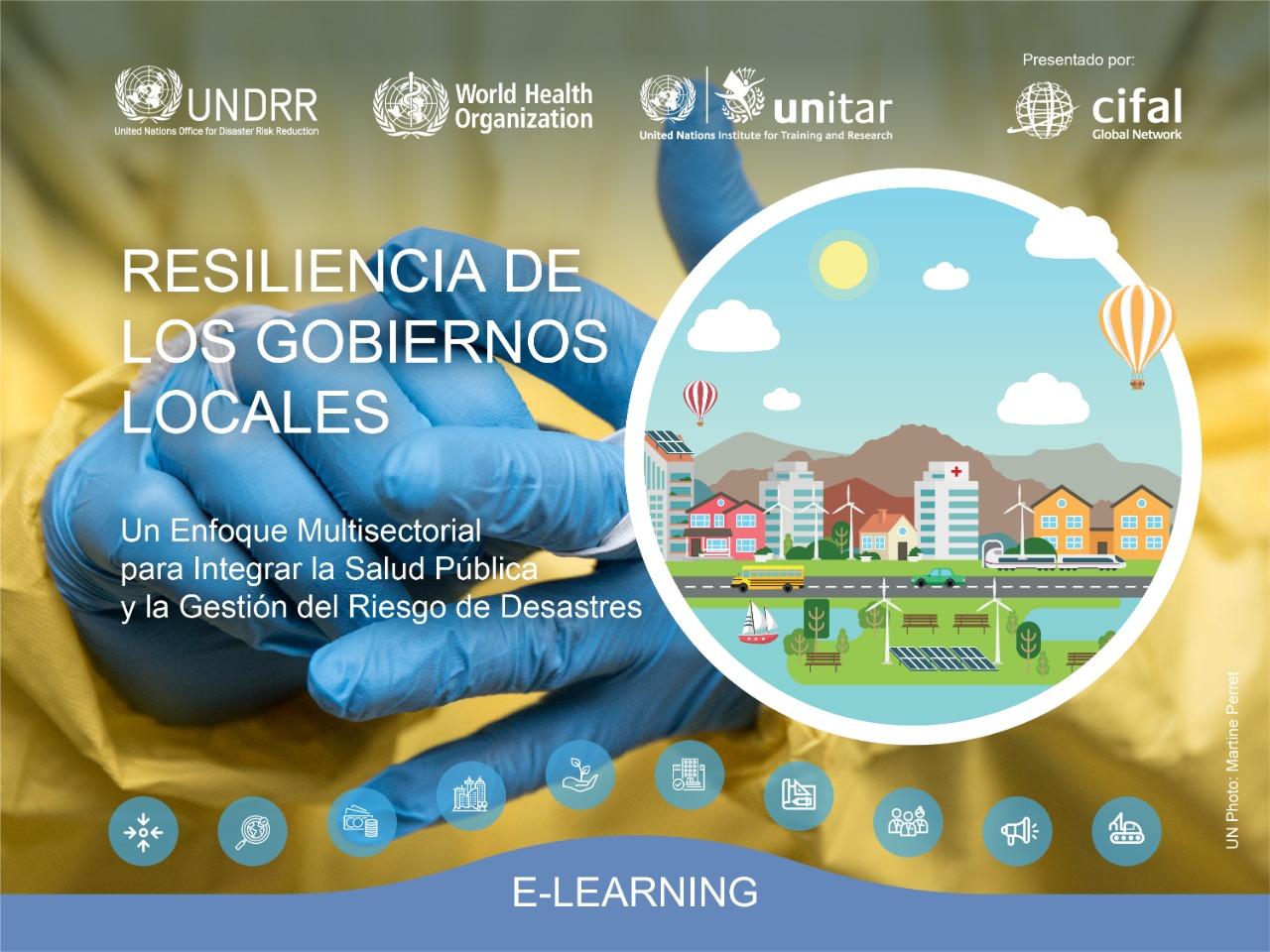
Resiliencia de los gobiernos locales: Un enfoque multisectorial para integrar la salud pública y la gestión del riesgo de desastres
Oficina de las Naciones Unidas para la Reducción del Riesgo de Desastres (UNDRR) – Oficina Regional para Las América y El Caribe, UNDRR -Instituto Global de Educación y Formación (GETI), Organización Mundial de la Salud (OMS)
In line with the Sendai Framework for Disaster Risk Reduction 2015-2030 and SDGs 11.B and 3.D, this course seeks to contribute to strengthening the capacity of local governments to develop holistic disaster risk reduction policies and plans as a strategy to improve disaster resilience capacity, including threats to public health.
All communities are exposed to emergencies and disasters related to any type of natural hazards, epidemic outbreaks and those produced by man, biological, chemical, radiological, technological, conflicts and others. In a context of increasing urbanization and climate change, the frequency, severity and impact of disasters has been exacerbated. The economic, political, and social consequences of these events can be devastating for both developed and developing countries.
The Latin American and Caribbean Region is exposed every year to a wide range of emergencies and disasters of increasing scale and frequency. These phenomena have a strong impact on the health of populations and constitute a major challenge for the countries of the region, which must protect the health of their citizens.
Recent health emergencies such as the COVID-19 pandemic have exposed millions of people and caused thousands of deaths around the world. Disasters such as pandemics pose a major challenge to health and human development. COVID-19 illustrates the profound impact that disasters have on health systems and other systems within a city and country. At the same time, they demand comprehensive preparedness and response measures in coordination with other actors and sectors of society.
In line with the Sendai Framework for Disaster Risk Reduction 2015-2030 and the Sustainable Development Goals (SDGs 11.B and 3.D), this course offered by the United Nations Office for Disaster Risk Reduction (UNDRR) – Regional Office for the Americas and the Caribbean, the World Health Organization (WHO) and the United Nations Institute for Training and Research ( UNITAR) aims to contribute to strengthening the capacity of local governments to develop holistic disaster risk reduction policies and plans as a strategy to improve resilience to disasters, including public health threats.
In the context of current and emerging risks to public health, as well as in view of the need for effective coordination and efficient management of resources, this course presents two conceptual and practical frameworks that provide guidance on how to integrate public health systems and disaster risk management:
- The Self-Assessment Tool for Disaster Resilience at the Local Level: Resilience of Public Health Systems – Annex developed by UNDRR with the aim of providing a tool that contributes to the strengthening of resilience at the local level through the integration of public health issues into disaster risk management and resilience planning.
- The WHO Health Emergencies and Disaster Risk Management Framework provides a holistic approach that can be applied by all actors in the public sector and other sectors that are responsible for reducing the risks and consequences of emergencies and disasters, and strengthening the resilience of health systems. communities and countries.
By the end of this course, participants will be able to:
Module 1:
- Recognize the Self-Assessment Tool for Disaster Resilience at the Local Level;
- Identify the Annex - Resilience of Public Health Systems as a complementary tool that addresses disaster-related public health issues.
Module 2:
- Describe the main elements, concepts, principles, components and functions of the WHO Health Emergencies and Disaster Risk Management Framework.
Module 3:
- Explain the structure of the Self-Assessment Tool for Disaster Resilience at the Local Level: Resilience of Public Health Systems – Annex;
- Use the Self-Assessment Tool for Disaster Resilience at the Local Level: Resilience of Public Health Systems – Annex as a tool that contributes to integrating public health aspects with disaster risk reduction strategies at the local level.
This online course comprises three modules that can be completed in the two-week period:
Module 1: Introduction to the Self-Assessment Tool for Local Disaster Resilience and the Annex - Resilience of Public Health Systems
Module 2: Introduction to the WHO Health Emergency and Disaster Risk Management Framework
Module 3: Analysis of the Self-Assessment Tool for Disaster Resilience at the Local Level: Resilience of Public Health Systems - Annex
Self-study course.
- Government officials
- Health professionals
- Disaster Management Professionals
- Academic and training institutions working on disaster risk reduction
UNDRR Address:
4F G-Tower, 175 Art Center Dae-ro,
Yeonsu-Gu, Incheon 22004, Republic of Korea

